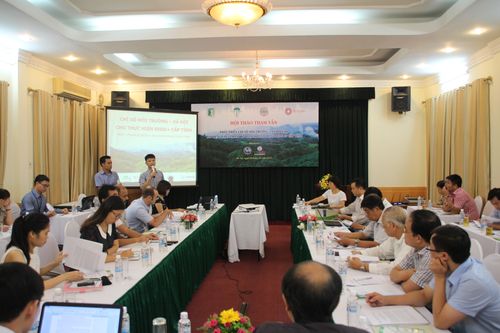Tucked away in the highlands of Hà Giang, the small…

Workshop: Environmental and Social Index for Developing and Monitoring the Provincial REDD+ Action Plan!
Reducing Emission from Deforestation and Forest Degradation (REDD+) is international initiative which focuses on the role of forest in global climate change mitigation, as well as generate a couple of co-benefits, such as: sustainable forest management and improvement of local livelihoods. As one of REDD+ piloted countries, Vietnam has approved the Decision No. 799/2012/Q?-TTg of 27th June 2012 on the National Action Program on reducing greenhouse gas emissions through efforts to avoid deforestation and forest degradation, sustainable forest management, conservation and enhancement of forest carbon stocks in the period 2011-2020. Based on this legal document, the relevant provincial people’s committees are responsible for developing and implementing the provincial REDD+ action plans (PRAP).
However, as the new and unprecedented initiative, many studies and discussion have urgently highlighted that REDD+ may bring unpredictable threats due to changes in land-use planning, natural resource access rights, then impact on the livelihoods of local communities, especially indigenous people who rely on forests. Therefore, just as the baseline data on deforestation or carbon emissions is developed in REDD+ countries, similar attention needs to be paid to the before and after effects of REDD+ on environmental and social aspects since the beginning of REDD+ development and design stages. Further, it is especially important for investors and development partners (governments, non- government organization or private sector) who are investigating opportunities for forest carbon investment, in process of finding optimal locations to implement REDD+ and forecasting potential impact of their projects on local people as well as the risks that such investments might run.
In order to maximize the benefits while minimizing the risks of REDD+, numbers of environmental and social safeguards principles and criteria have been published by different stakeholders, such as: the Cancun environmental and social safeguard principles (UNFCCC), Social and Environmental Standards (SES), Social and Environmental Principles of UN-REDD or Safeguards Policies under FCPF by World Bank, or Forest Carbon Index. However, despite extensive content, these principles and standards have attempted to compare the spatial distribution of carbon-rich forests with economic and social risks at national level, but not focused on the risks and impacts at provincial and household level, which is where the on-the-ground REDD+ action will take place.

For these reasons, during the last three years (2012 – 2015), the Center for People and Nature Reconciliation (PanNature) in collaboration with the Center for Natural Resources & Environmental Studies (CRES), Tropenbos Vietnam, and technical support from Dr. Pamela McElwee (Rutgers University, USA) have developed the countrywide index for REDD+ at sub-national level, called REDD+ Environmental and Social Index (RESI). This is one of the outcomes under the project Research and Capacity Building on REDD+, Livelihoods and Vulnerability in Vietnam: Developing Tools for Social Analysis and Development Planning (PEER). RESI can be understood as a safeguard tool that assesses, scores and ranks the quality of four key components: Legal and Policy Framework, Institutional Setting, Environmental Context and Challenges, Social Context and Challenges, in each potential REDD+ province; then reflects the pros and cons if REDD+ will be developed and implemented in each particular local context. In other words, RESI can be understood as a pioneering measurement of current REDD+ readiness level of provinces before starting any REDD+ activities. Such an index will be expected to provide useful input to the development and monitoring the Provincial REDD+ Action Plan (PRAP), as well as allow the quantification of relevant criteria for purposes of comparison and selection across REDD+ potential sites.
In 2013 and 2014, RESI tool had been tested in Lam Dong and piloted in 04 provinces: Son La, Dien Bien, Kon Tum and Kien Giang. In order to introduce RESI tool and share outcomes of piloted assessment, PanNature in collaboration with the project partners will organize the consultation workshop on Environmental and Social Index for Developing and Monitoring the Provincial REDD+ Action Plan, with the following specific objectives:
- Introduction of RESI: Conceptual Framework, Criteria & Indicators and Toolkit;
- Outcome of RESI piloting assessment in Son La, Dien Bien, Kon Tum and Kien Giang; and
- Discussion about the RESI and the ability to apply the index in the process of developing and monitoring Provincial REDD+ Action Plan in period 2016-2020, as well as other REDD+ programs and projects in Vietnam.
Time and Place:
Place: La Thanh Hotel, 218 Doi Can Street, Ba Dinh, Hanoi
Time: 8:00 – 17:00, 9th September, 2015
Workshop Materials:
The Provincial REDD+ Action Plan Guidelines in Vietnam: Approach, Progress and the Integration of Environmental and Social Safeguard Requirements
Dr. Shyam Paudel, the Vietnam National UN-REDD Phase 2 Program
Experiences on identifying and integrating environmental and social safeguard principles in PRAP: Lam Dong case study
Mr. Richard Rastall, SNV Vietnam
Introduction of the REDD+ Environmental and Social Index (RESI)
Mr. Nguyen Viet Dung, PanNature
RESI in Son La, Dien Bien, Kon Tum and Kien Giang: Comparision and Key Findings
Ms. Nguyen Hai Van, PanNature



